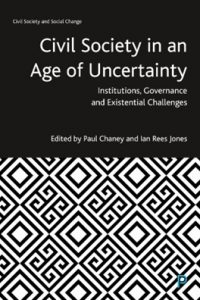 A new book edited by Paul Chaney and Ian Rees Jones presents original findings and brings together core strands of theory to highlight some of the pressing challenges facing civil society.
A new book edited by Paul Chaney and Ian Rees Jones presents original findings and brings together core strands of theory to highlight some of the pressing challenges facing civil society.
It is the latest edited volume to be published as part of the Civil Society and Social Change book series with Policy Press and highlights transferable lessons that will inform policy and practice in today’s age of uncertainty. The multi-disciplinary research that is featured comes from WISERD’s civil society research programme.
Editor, Professor Paul Chaney, said: “Our overall argument in this volume is the importance of civil society to individual and collective well-being, as well as the health of democracy. On the one hand, our research shows the resilience of civil society and its adaptability to meet uncertainties, yet on the other, we argue that civil society’s ability to prevail in the face of the existential challenges is far from assured. Rather, it requires ongoing vigilance, social self-organisation and criticality. We also underline the threat from political elites’ failure to listen and engage diverse interests, as well as civil society organisations’ mistrust and lack of capacity to participate.”
- In Chapter 3, ‘Civil society and the governance of city region economic development’, David Beel, Martin Jones and Ian Rees Jones analyse the challenges posed to civil society by different economic development models, revealing how they are creating significant tensions as well as presenting opportunities for civil society actors.
- In Chapter 4, ‘Civil society, pandemic, and the crisis of welfare: exploring mixed economy models of welfare in domiciliary adult social care in a devolved UK’, Paul Chaney and Christala Sophocleous draw on the literature of welfare pluralism and present new empirical evidence. They discuss whether civil society is the answer to meeting modern welfare needs and explore the challenges that this presents.
- Chapter 5, ‘The contemporary threat to minority languages and cultures: civil society, young people and Celtic language use in Scotland and Wales’ by Rhys Jones, Elin Royles, Fiona O’Hanlon and Lindsay Paterson, explores civil society’s past and present role in addressing the existential threat facing two ‘minority’ languages: Welsh and Scottish Gaelic. This is an internationally salient issue. Experts predict that a half of the estimated 6,800 languages spoken today will have disappeared by the end of the 21st century.
- In Chapter 6, ‘Digital threat or opportunity? Local civil society in an age of global inter-connectivity’, Michael Woods, Taulant Guma and Sophie Yarker examine the challenges and opportunities for local civil society arising from digital technologies, especially social media. They consider how these have impacted on the ways in which local civil society groups operate and organise within their localities; and how digital technologies impact upon local civil society groups’ ability to forge connections beyond their local area.
- In Chapter 7, ‘Democratic decline? Civil society and trust in government’, Alistair Cole, Ian Stafford and Dominic Heinz examine the contemporary decline of political trust and the potential existential threat that this poses to democracy. Drawing on comparative analysis from the UK, France and Germany, they consider the role of civil society in potential solutions for restoring political trust and reversing the perceived decline of democracy.
- In Chapter 8, ‘Xenophobia, hostility and austerity: European migrants and civil society in Wales’, Stephen Drinkwater, Taulant Guma and Rhys Dafydd Jones provide rich new insights into migrants’ experiences of setting up and running new civil society initiatives and reflect on the post-Brexit environment for xenophobia and xenoracism, the reporting of hate crimes, and the adequacy of the wider policy environment for upholding migrants’ rights and sustaining civil society.
Professor Chaney concludes: “In the final chapter, ‘Prospects and perils for civil society in the 21st century’, we reflect upon the implications of the volume’s empirical analysis and summarise the core challenges and lessons emerging from this multi-disciplinary set of studies. We also explore the prospects and perils for civil society organisations in the context of ongoing existential challenges in an age of uncertainty.”
For a 25% discount, see https://bristoluniversitypress.co.uk/signup-bup-pp
